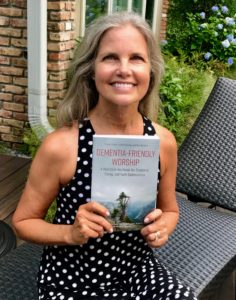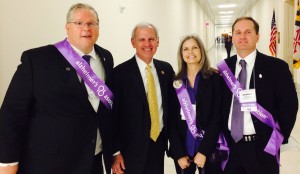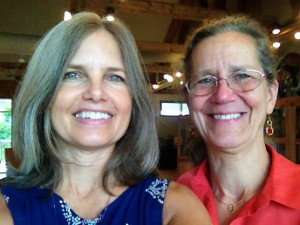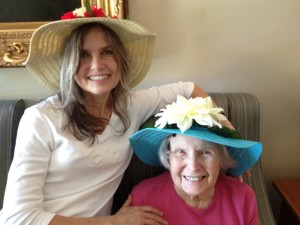Author Publications
 Joining people living with dementia in worship is a spiritual blessing that is like no other. Collaborating with 40 authors, I have the privilege of telling my story of how spontaneous worship erupted while caring for my mom in long-term care. Dementia Friendly Worship – A Multifaith Handbook for Chaplains, Clergy, and Faith Communities is available at amazon.com.
Joining people living with dementia in worship is a spiritual blessing that is like no other. Collaborating with 40 authors, I have the privilege of telling my story of how spontaneous worship erupted while caring for my mom in long-term care. Dementia Friendly Worship – A Multifaith Handbook for Chaplains, Clergy, and Faith Communities is available at amazon.com.
on April 23, 2014 at 3:17 PM, updated April 23, 2014 at 3:23 PM
I am among the 15.5 million unpaid caregivers whose life is radically altered by providing care for my mother and aunt. I oversee their lives daily, handle their finances and problem-solve their every challenge.
Thank you to Bradley Byrne for meeting with our delegation to discuss the Alzheimer’s crisis. It is the most expensive disease in America; nearly one in every $5 spent by Medicare is on people with Alzheimer’s or another dementia, yet there is no cure in sight.
In addition to the human toll, Alzheimer’s costs $214 billion a year. Because of our growing senior population, unless science finds a way to slow progression or delay onset, Alzheimer’s will cost an estimated $1.2 trillion by 2050. More information can be found on alz.org by accessing the 2014 Facts and Figures State Statistics Sheets.
At the recent 26th annual Alzheimer’s Association Advocacy Forum in Washington, D.C., I heard Alzheimer’s advocate Dr. Francis Collins, director of the National Institute of Health, say that we are not, at the moment, limited by ideas, scientific opportunities or by talent. He stated, “We are, unfortunately, limited by resources to be able to move this enterprise forward at the pace that it could take.”
Please understand that this disease is epidemic and could affect almost everyone. One in three seniors dies from Alzheimer’s disease. The number of people in Alabama living with the disease is projected to increase from 14 percent to 24 percent by 2050. Approximately 500,000 people die each year because they have Alzheimer’s disease.
I hope you will join us by putting on your purple and support increased funding for Alzheimer’s research by $200 million in fiscal year 2015.
It is only through adequate funding and a strong implementation of the National Plan to Address Alzheimer’s Disease that we will meet its goal of preventing and effectively treating Alzheimer’s by 2025.
Beth Reinert
South Alabama Advocate for the Alzheimer’s Association
BETH REINERT – GUEST OPINION Press-Register, September 18, 2013
Advocate seeks to change perception of dementia
Have you ever been asked the question, “Who would you most want to have dinner with?” My answer is Teepa Snow, an award-winning occupational therapist who has made it her mission to help family and professional caregivers do a better job of caring for people with dementia.
Snow is a mentor and voice of confidence for the millions living with the disease. I have learned from her teachings to better understand how to help my mom live with dementia.
I caught up with Snow recently in Mobile while she was there for a speaking engagement. We chatted for several hours about our shared focus: advocating for men and women who have dementia.
Dementia is an umbrella term that covers 70 to 80 conditions of brain failure. A dementia diagnosis is lifealtering for not only the person living with the disease, but also for the person’s family.
More than 50 percent of diagnosed types of dementia are Alzheimer’s cases, but often a secondary dementia emerges as the disease progresses.
Alzheimer’s disease is the sixth-leading cause of death in the U.S. No pill will take this problem away, so the key to a positive outcome is how caregivers manage our actions, words and reactions.
Snow has a message not only for families and care professionals, but also for all of society. “Policemen, firefighters, emergency room workers, postal service and bank employees all need to be familiar with the signs of dementia.” she said.
“We as a society must have a basic awareness of dementia and embrace people living with dementia instead of labeling them as demented people.”
Snow wants to change the perception of how dementia is viewed, take away the negative terminology and create the right setting and care for men and women with dementia.
At risk herself
Snow’s popularity took off in the late ‘90s after she presented a staff training model at the International Alzheimer Meeting in Washington, D.C. Her DVD, “Accepting the Challenge,” has been widely distributed. She is the most prominent educator for training on all aspects of Alzheimer’s disease care. That is why her calendar is booked through 2015.
Snow also has a history of dementia on both her mother’s side and father’s side of the family.
She knows she is at risk for developing the disease, so she is living life carefully by making good choices. She keeps physically fit, manages stress with yoga and deep breathing, and eats well.
Snow’s website, teepasnow. com, is full of information that both professional and family caregivers should see.
Free webinars can be accessed from her Dementia Care Academy, and DVDs are available for purchase. Not everyone can attend her workshops, but anyone with Internet access can learn from her teachings.
With the coming tide of senior baby boomers on the horizon, everyone needs to know about dementia. We should all get to know what Snow has to say about it.
Beth Reinert advocates for people living with Alzheimer’s disease. She authors the blog Caregiversunite.org, which includes general news and advice for families coping with the disease, along with event listings for the south Alabama area.
Offering hope Mobile Press Register Senior Resource Magazine 2013
Local caregiver hosts blog to help others
My mom has Alzheimer’s disease. Just as most unsuspecting caregivers, I have learned to care for my mother by research and observation. For a good bit of my newly acquired knowledge, the examples of others have helped me the most. My best teachers for her hands-on care have been the Certified Nursing Assistants (CNAs) hired to help her with activities of daily living.
They trained me how to provide toileting for my mother with confidence. I’ve learned from them how to assist her in walking, how to help her stand up from a chair, and how to sit down safely. I have mastered how to clean and brush her teeth with her complete cooperation. I now can recognize behaviors that suggest health problems she can’t express with words. I’ve learned how to get her in and out of the car. Surprisingly, I have learned from the examples of the CNAs how to kiss and hug my mother and tell her I love her.
My other most influential resource is experiences from friends and families that I’ve met along the Alzheimer’s journey.
The choices of adult children who take care of their own parent have helped me to best navigate all that is available from the health care system.
On the other hand, the Internet has proven to be an endless source of information. Thorough explanations on every challenge we’ve encountered is covered on multiple sites. From medication side effects to how to avoid agitation, I’ve found the World Wide Web to be a wealth of knowledge.
Motivated by the benefits of the information gathered over the last five years, I want to share with others what I know and give them the opportunity to do the same. Caregiversunite.org is a local blog where questions can be asked, answers given from a variety of experiences and resources, and referrals made for needed help. I hope for an easy exchange of items such as a lift chair, walker or wheelchair needed by one person and no longer needed by another.
This is a place to have a voice! This is where you can learn, share, and exchange knowledge so that living with Alzheimer’s disease and dementia can be a little easier. Here you will find that you are not alone, that many people are walking this same care partnering journey as you, and you can benefit from the support of others and utilize the help available to us.
All this can be available on Caregiversunite.org but only with your help. Spend a few minutes to log on and become a part of this growing blog. Subscribe so you will get email or Facebook notifications with each new post. Make comments or ask questions regarding areas of interest to you. This can be our quick, 24/7 place to communicate. Experience is a great teacher. Bring it to caregiversunite. org.
Caregiversunite.org is a blog for caregivers to have a conversation. Connect there to ask questions and pass on referrals and valuable lessons learned so that we as caregivers can do a better job.
– Beth Reinert
April 2013
Press-Register Sunday, November 11, 2012 Local Caregiver’s Unite!
My mother was diagnosed with Alzheimer’s disease in 2008. Preparing for her long-term care, meeting her financial requirements and offering meaningful activities have dominated my life. In addition to caring for all of her needs, I’ve spent hours doing research on the Internet, reading books and making phone calls for just one reason: So I could provide her with the best care possible.
The number of unpaid caregivers for Alzheimer’s patients in the United States totals over 10 million, yet the job is often lonely and unrecognized. Most of us aren’t prepared to take on such care of a loved one, but once the commitment is made, we have so much to learn.
While overcoming one challenge after another, I have come to realize how vital caregivers are. We are the ones who make the decisions that determine quality of life, medical care and safety. Even with help from my sister, I finally realized that a team of people is necessary to provide 24/7 care. But where do I go for help?
Finding a support group was a good place to start. The first time I sat down with families living with Alzheimer’s disease, I felt so relieved that I wanted to cry. Here were my comrades, the ones who knew what I was going through. I found good referrals, creative suggestions and listening ears from the group participants. I also received help from the E.A. Roberts Center, from family members, from my church, from home health care, from hospice, from the staff at the assisted living facility where she lives and from the private sitters scheduled to keep her company.
I found resources through the South Alabama Regional Planning Commission and the Area Agency on Aging and became involved with them as a volunteer. They put on an annual Caregiver Conference that I attended for the first time last year. I still benefit from what I learned at the conference. Where else can you acquire facts on bladder and bowel health, hear about the latest products for incontinence and learn how to qualify for Medicaid when the time comes? Information about these topics helped me overcome problems that seemed insurmountable at first. Now I face these issues and many others with confidence.
I’ve heard that the new optimism is solutions. Well, solutions can be found at the Caregiver Conference on November 14, 2012 at the Daphne Civic Center. It’s free to attend and they offer adult day care or in-home sitters at no cost to make it possible for you to attend. If you are a caregiver—unpaid or professional—I urge you to continue to educate yourself by attending this conference. Your job will become easier and the care you are giving will improve. You can even earn CEUs if you need them.
I want all caregivers to be able to easily access services from our local community. In my association with Area Agency on Aging, they have listened to my concerns about the needs of caregivers and dementia patients. As a result, the Alzheimer’s Disease and Dementia Association Helpline was developed and is ready to be launched on November 15. By calling 251-706-4680, local information and resources for family members or clients with Alzheimer’s or dementia can be found.
As my mother’s disease progresses, I know that we will embrace what each day brings. With continued faith and asking for help when we need it, I trust my mother will continue to have the care and love that she deserves. For those interested in attending this year’s Caregiver Conference the final day to RSVP is Tuesday, Nov. 13. You can do so by calling 251-433-6541.
Beth Reinert has a master’s degree in education and serves on the South Alabama Alzheimer’s and Dementia Coalition. She can be reached at pittman1212@comcast.net.




